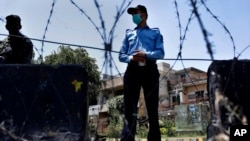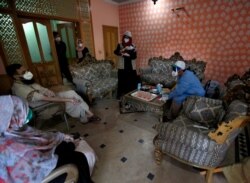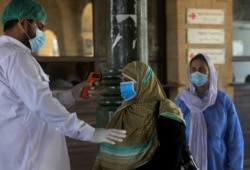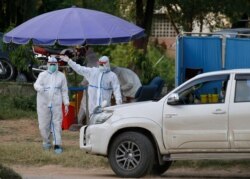Pakistan has turned to its spy agency’s terror surveillance technology to track coronavirus patients, which rights activists and medical professionals worry could lead to the “militarization of a health emergency” and stigma toward infected people.
Following a spike in the number of confirmed COVID-19 cases, Prime Minister Imran Khan announced on April 23 that the Inter-Services Intelligence (ISI), the country’s military-run spy agency, was helping the government track patients through technology that is used to hunt down militants.
“The ISI has given us an incredible system for track and trace,” Khan said during a telethon event for victims of the pandemic.
However, some rights activists say they fear the surveillance method could be misused by authorities to gain more access into the lives of Pakistani civilians, particularly those who are critical of the government.
'Militarization' of health crisis
According to Hija Kamran, a spokesperson for Pakistan’s not-for-profit Media Matters for Democracy, the surveillance could easily be abused by those with “unrestricted access to the technology.”
“The militarization of a health emergency could put journalists, activists, already marginalized communities and individuals at risk of being the target of the ongoing trend of crackdown on privacy and freedom of expression in the country,” she said.
Pakistan’s intelligence agencies have often been accused of forced disappearances, harassment, blackmailing and coercion by activists and rights groups that are critical of the state’s policies, such as the Pashtun Tahafuz Movement and Voice of Baloch Missing Persons.
Afrasiab Khattak, a former Pakistani senator and a Pashtun rights activist, said that the tracking device used by the Pakistani government could mean that it is criminalizing those infected with the virus.
The coronavirus, Khattak said, has already resulted in social stigma against those diagnosed, adding that ISI technology will “deepen the perception” that embodies “the extreme militarization of Pakistani society.”
Thinking local
“We should go for better alternatives, like reviving the local government system, for reaching out to the affected people,” he told VOA.
Pakistan’s leadership says the track-and-trace technology would help the government sustain the country’s already weak economy during the pandemic. Khan has repeatedly appealed for international aid, saying his country’s economic condition is not prepared to handle the pandemic spread.
The World Bank on April granted Pakistan a $200 million emergency response package to help “take effective and timely action to respond to the COVID-19 pandemic by strengthening the country’s national health care systems and mitigating socioeconomic disruptions.”
More recently, on May 21, the World Bank said it approved a $500 million program to help Pakistan’s health care, among other sectors, as the country tries to combat the pandemic.
Meanwhile, Islamabad last month allocated a supplementary grant of Rs1.66 billion (more than $10 million USD) to the ISI through its Economic Coordination Committee (ECC). The government said the funding could help the agency’s monitoring project for the coronavirus.
Trying to help
Pakistan’s retired three-star army Lieutenant General Talat Masood told VOA the ISI’s monitoring could help the government in the management and treatment of thousands of coronavirus cases. The agency’s “distinct device,” he said, is being used to assist health care professionals to also identify the virus’s hot spots.
“They [ISI] have the technology, the instruments, and this whole system already in place. I believe they are trying to be as helpful as possible with the technology,” he added.
Although digital surveillance of this kind may be useful during the pandemic, it risks breaching citizen rights and privacy, according to London-based digital rights researcher Samuel Woodhams.
“Without adequate scrutiny and accountability, there is a risk that it will remain in use long after the virus has passed,” he warned.
Some doctors in Pakistan say they are not sure that ISI technology could help the country’s health care system to manage the pandemic, particularly in densely populated areas where extreme poverty and misconceptions surrounding the virus are high.
Khalil ur Rehman Khalil, a doctor based in Khyber Pakhtunkhwa, told VOA a more effective way for the government to fight the virus at this point is through increasing awareness among people and improving testing ability of hospitals.
Khalil said public hospitals do not test for coronavirus unless someone shows symptoms, leaving low-income Pakistanis who cannot afford private health care vulnerable.
Factors in spread of disease
The cost of treatment, the fear of being ostracized, the fear of not receiving a proper burial according to Islamic tradition, and lack of understanding the concept of social distancing have all contributed to a rapid spread, he said.
“Whoever was diagnosed with COVID-19 would be admitted to the hospital in a ward that did not allow visitors," Khalil told VOA. "If the patient died of the virus, they would not hand over the body to relatives. The bathing of the body, final rites and rituals normally performed by family members were all done in the hospital. And they would take the body directly to the graveyard, where only a few people were allowed to attend the funeral. ”
The government procedures, he added, have discouraged people from attending public hospitals for treatment.
Pakistan reported its first two cases of the coronavirus in late February. The number has since then grown to more than 132,000 confirmed cases and more than 2,500 deaths.







